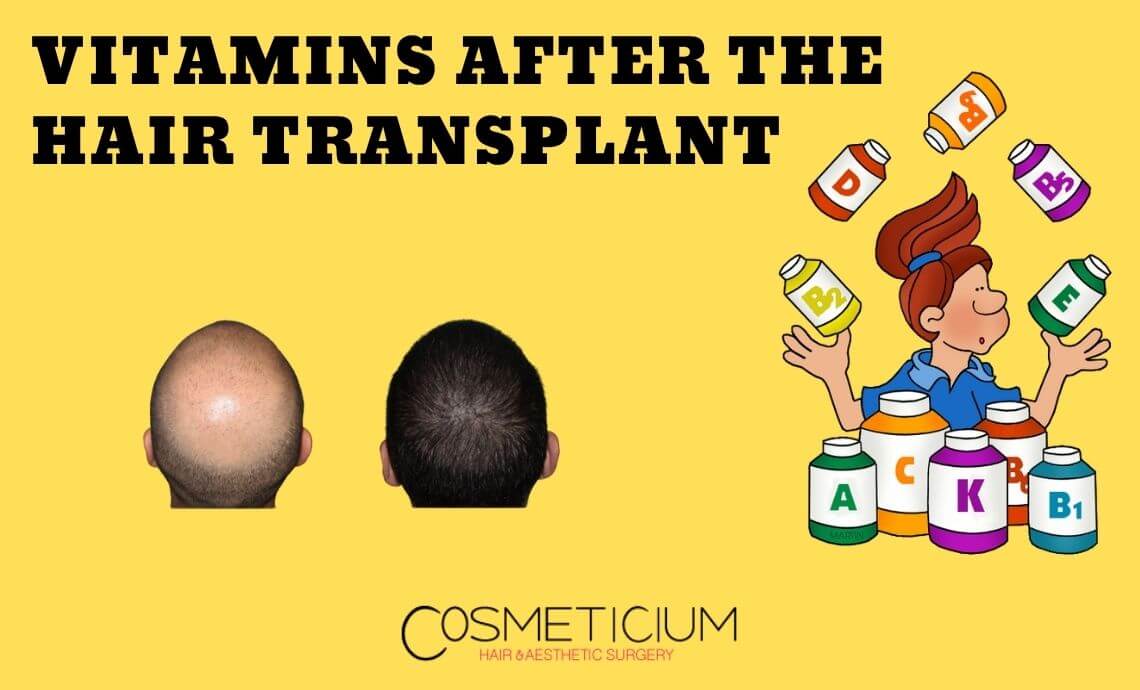Although it may seem different from other surgical procedures, it should not be forgotten that hair transplantation is also an operation. Therefore, there are things to consider after hair transplantation. Especially vitamins taken through food and other means are very important. Vitamins, minerals, proteins, and other substances that are taken with nutrition will strengthen the hair follicles. Proper nutrition is effective in making the transplanted hair healthier. If the right amount of vitamins is not taken, the transplanted hair may become weak or grow slowly. What is the importance of vitamins after the hair transplantation? Which vitamins provide the greatest benefit to the transplanted hair? All the details are in our article.
Table of Contents
The Importance of Vitamins in Hair Transplantation
Vitamins are one of the important substances that affect the functioning of the body. Some of these vitamins cannot be produced by our bodies. Therefore, they must be taken externally. Taking adequate and correct vitamins for the body after an important surgical procedure such as hair transplantation directly affects the success of the procedure.
Newly transplanted grafts need more vitamins than natural hair. Vitamin B6 capsules can be used to strengthen and make them grow quickly. Besides, you can increase the amount of oxygen carried by the blood by taking iron supplements in addition to vitamin B6. Thus, the newly transplanted hair will be nourished much more effectively.
All the vitamins, minerals, and proteins you need are present in the foods consumed. However, the necessity of a well-balanced diet should not be forgotten here. Problems in mineral, vitamin, fatty acid, and protein intake negatively affect the continuing cycle of the hair. It may cause results such as weakening of the hair follicles, slow growth of hair, and even loss of the hair.
Details about the vitamins you should take after the hair transplantation and their effects are as below.
1. B complex Vitamins
B complex (B6, B7, and B12, etc.) vitamins directly affect hair structure and growth. Besides, they optimize protein and fat levels. Thus, the healing process is shortened. Foods to be preferred for the intake of these vitamins are meat, avocado, chicken, brown rice, eggs, and nuts. However, when the vitamins taken through food are insufficient, vitamin capsules can be used depending on the doctor’s recommendation.
You May Also Like: What Can I Eat After Hair Transplantation?
2. Vitamin A
Vitamin A contributes to the growth of many different types of cells. Hair follicles are among these cells. Besides, it is effective in the production of sebum, an oily substance that moisturizes the scalp. If enough vitamin A is not taken, the scalp may become dry and itchy. It should not be forgotten that one of the most important problems after the hair transplantation is a dry and itchy scalp.
3. Vitamin C
Vitamin C is known for its antioxidant properties. Thanks to this feature, it shortens the healing process. Besides, it supports elastin and collagen production. Thus, it contributes to transplanted hair to become healthier. Vitamin C also fights with oxidative stress. As it is known, this type of stress causes hair to fall out and whiten.
You May Also Like: How Can I Speed Up Healing After Hair Transplantation?
4. Vitamin E
Vitamin E, another vitamin with antioxidant properties, also shortens the healing process. It accelerates the healing of skin damage and prevents the scars from being permanent. It has an important effect on the repair of damaged hair follicles. Experts recommend the use of vitamin E to soften the healing wounds and normalize that area. You can get vitamin E from foods such as spinach, avocados, almonds, and olive oil.
5. Zinc
Zinc is one of the minerals used in many areas of the body functioning. It functions in the regulation of hormone level, collagen production, protein synthesis, vitamin absorption, and cell proliferation. It must be taken after hair transplant surgery. The lack of this substance directly triggers hair loss. It is found in foods such as cashew, beef, pumpkin seeds, and oysters.
You May Also Like: Why You Shouldn’t Use Alcohol and Smoke After Hair Transplantation?
6. Iron
Another important mineral for the body is iron. Its deficiency may result in hair weakening and hair loss. With sufficient iron taken, the hair follicles are strengthened and the oxygen and nutrient flow to the hair accelerates. This substance, which provides strengthening of immunity, can also shorten the healing process. It is found in foods such as beef liver, spinach, beef, and beans.


